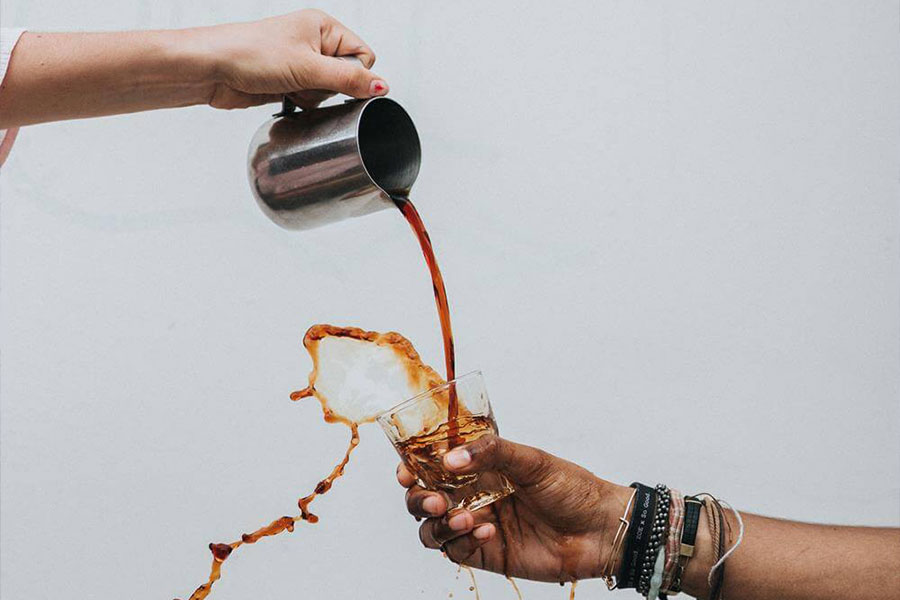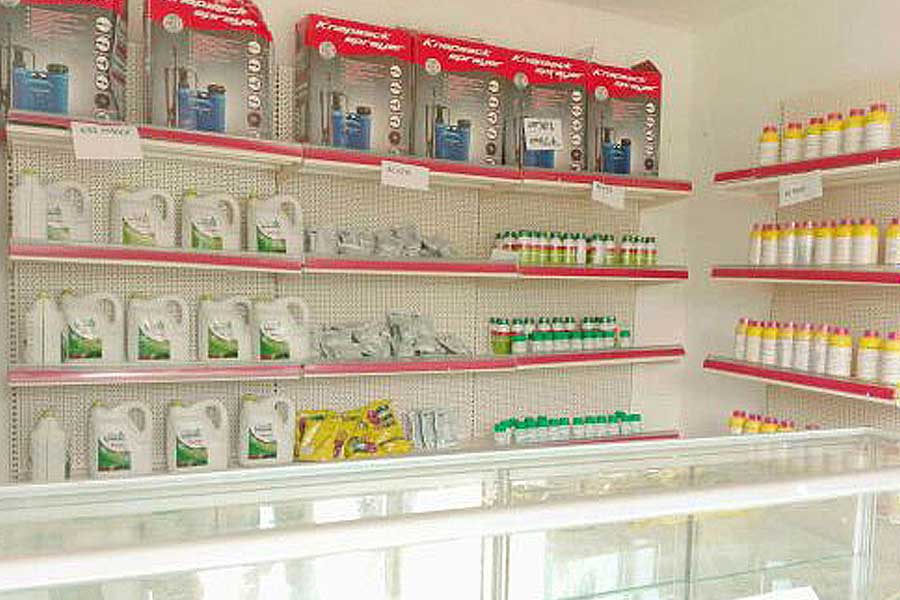
It is a small but cosy establishment dubbed "Beer Lovers" located in the Ayat neighbourhood, in the northeast suburbia of Addis Abeba. Over two dozen customers braved the chilly night, grouped around small circles enjoying a refreshing cold beer. They were catching up, talking about the recent holiday celebrations and their work lives. The bar could be noisy, making low volume conversation challenging to be had.
The waiters were rushing around, taking orders but mindful of the owner's giving direction behind the balcony.
Selamawit Birhanu, 28, an accountant working for an auditing firm, seldom drinks beer or otherwise. But on a Sunday evening last month, she met friends at Beer Lovers. Her friends were putting pressure on her to join them in the brewskies fest. They were unyielding. After much convincing, Selamawit relented and ordered a bottle of Arada, a hard-seltzer cocktail drink that has exploded in popularity.
Arada has an alcohol content of five percent and comes in three flavours: pineapple-grapefruit, apple, and lime. Selamawit opted for the lime flavour.
"I liked the sweetness," she said, showing her surprise at being able to enjoy an alcoholic beverage.
Selamawit is only one of many young customers who have developed a penchant for the sweet refreshment since it first appeared on shelves a few months ago. It has quickly become common to see staff at a bar or restaurant rushing to tables, carrying bottles of Arada alongside the more traditional orders of beer or liquor. It is a new trend when the beverage industry is feeling the pinch of the excise tax, which has lowered the productivity of beverage plants by as much as 20pc.
However, Arada's success comes as a surprise to industry players who have been reluctant to develop new products.
The COVID-19 pandemic had forced the brewery industry to shut down plants for months, pushing beverage companies to cut down on the planned development of new products and undertaking expansions. It is a gear in reverse from pre-pandemic years when undertaking expansion projects was the game. The largest brewer, BGI Ethiopia, had acquired Raya and Zebidar breweries during this period, positioning itself as a market-dominant force in all different parts of the country.
Breweries, in general, have dominated the beverage market for years. Though they still do, a new line of products gives them a run for their money.
Introduced by Komari Beverage Plc in April this year, Arada is the first hard-seltzer beverage bottled in Ethiopia, available in the market for an average price of 30 Br a bottle. It enjoyed almost instant success. Black trucks sporting the drink's rooster logo can be seen delivering piles of cases to bars and restaurants all over the city.
Komari, translated to "brewer" in Amharic, invested 26 million dollars in developing and launching the beverage, including extensive market research, which incorporated input from thousands of people on the kinds of drinks they enjoy and what flavours they would be interested in. Most of the equity was raised from investors from Germany, with Dashen Bank lending part of the finance. The plant in Cheke, 100Km northeast of Addis Abeba near Debre Brehan, can produce 27,000 bottles an hour.
The company, employing over 500 people, distributes its beverages from three warehouses in Addis Abeba. However, the capital is not the only place where customers access Arada. Bishoftu, Adama and Debre Berhan are where the product is also available.
Company executives are pleased with requests from liquor distributors increasing every month. They want to introduce a fourth flavour soon, according to Ojeuna Mekconenn, deputy CEO of Komari.
Arada's growing popularity is a trend in a market that has seen a consumer base shifting from beer to flavoured beverages. When Komari opened began bottling in April, it was the 12th alcoholic beverage producer for a market where beer is the mainstay. It is an uphill task to penetrate a market dominated by international brewers such as Heineken, Diageo and the Castel Group.
However, Arada is not the only success story.
Awash Wine S.C., the oldest winery, launched a wine cocktail beverage branded as "Dankira" in August 2019, a part of a two million dollar expansion project. It was first made available in two flavours - strawberry margarita and peach vodka with a six per cent alcohol content. A mint flavour cocktail was launched a few weeks ago.
"Despite instability in parts of the country, we've been working on developing our distribution channels over the past year," said Yordanos Seifu, category manager for Dankira.
Though the new entrants have seen success with their novel products, everyone cannot say the same.
Walia Beer, under Heineken, first entered the market in 2011 following the Dutch giant's acquisition of Harar and Bedele breweries for 163.4 million dollars through privatisation. Heineken owns brands such as Bedele, Harar, Buckler, and Sofi Malt. In 2017, the brewery launched its Walia Radler brand, beer mixed with lemonade or lemon-lime soda. However, the product had little going for it. Walia Radler was pulled off the shelves a year following its launch.
BGI Ethiopia, bottler of St. George Beer and industry pioneer, established a century ago with 38pc market share, had to go through a similar experience after launching a cider product dubbed "Panache" during the same period. The lime flavoured beverage has an alcohol content of 1.3pc, but the product disappeared from shelves after a brief stunt.
Grain and fruit-based fermented alcoholic beverages are not new to Ethiopia. Tella, borde, shamita, tej, and keribo are among the popular drinks produced locally and consumed where they are brewed. They are widely consumed among the rural population during holidays and special occasions such as weddings, religious celebrations and the commemoration of loved ones.
However, due to rapid urbanisation, traditional brewers in large cities have stopped, making brewing at home difficult. Though beverage companies have filled this gap, they have so far had little success in reaping profits from newly-launched products.
According to an expert with over 15 years of experience in the industry consulting for breweries, making a new product successful has become cumbersome in the last two years. Companies introduce new products to boost their sales and keep the market share of their iconic or main product strong. Whatever the intent of the beverage companies, bucking the trend helped the new industry players, including Komari, win faithful customers.
Andualem Erste, 22, a waiter at Beer Lovers, has seen this. Moved to the capital from Lasta two years ago, he observes that two dozen crates of the cocktail drink sell on weekends.
"Women are usually the ones to order it," Andualem told Fortune.
Despite the growth, those acquainted with the beverage industry doubt the longevity of the trend in Ethiopia.
"Cocktails and seltzers are not like beers," noted the expert. "Demand for these products has been waning in North America and Europe since last year."
The expert warns the same might happen in Ethiopia.
PUBLISHED ON
Oct 16,2021 [ VOL
22 , NO
1120]

Fortune News | Oct 02,2021

Featured | Sep 07,2025

View From Arada | Dec 25,2021

Editorial | May 15,2021

Radar | Jul 11,2021

News Analysis | Jul 03,2021

Fortune News | Mar 23,2022

Radar | Nov 27,2021

Fortune News | Jun 24,2022

Radar | Nov 29,2020

Dec 22 , 2024 . By TIZITA SHEWAFERAW
Charged with transforming colossal state-owned enterprises into modern and competitiv...

Aug 18 , 2024 . By AKSAH ITALO
Although predictable Yonas Zerihun's job in the ride-hailing service is not immune to...

Jul 28 , 2024 . By TIZITA SHEWAFERAW
Unhabitual, perhaps too many, Samuel Gebreyohannes, 38, used to occasionally enjoy a couple of beers at breakfast. However, he recently swit...

Jul 13 , 2024 . By AKSAH ITALO
Investors who rely on tractors, trucks, and field vehicles for commuting, transporting commodities, and f...

Oct 11 , 2025
Ladislas Farago, a roving Associated Press (AP) correspondent, arrived in Ethiopia in...

Oct 4 , 2025
Eyob Tekalegn (PhD) had been in the Governor's chair for only weeks when, on Septembe...

Sep 27 , 2025
Four years into an experiment with “shock therapy” in education, the national moo...

Sep 20 , 2025
Getachew Reda's return to the national stage was always going to stir attention. Once...